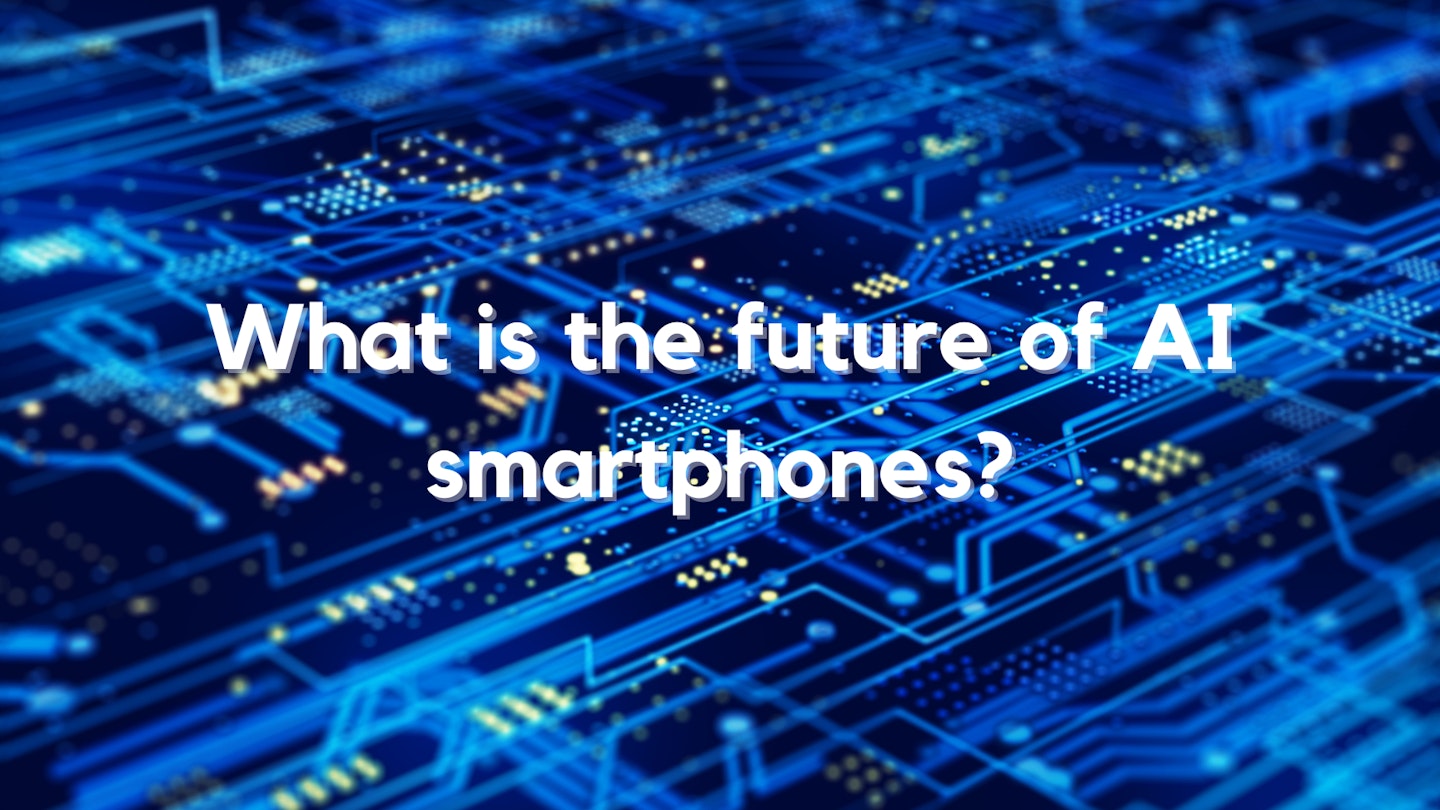AI has taken the technology world by storm in recent months, we've seen the rise of amazing generative AI chatbots, and incredible photo generation with the best smartphones on the market slowly receiving AI integration, which has left us all collectively impressed and terrified at its potential.
Artificial Intelligence has become a household technology overnight it seems, with millions of people experimenting with art, music, and even programming using AI tools. Samsung's latest AI-powered S24 lineup is even powered with Galaxy AI, which is bursting with brilliant features, including some truly excellent photo editing.
But what can AI-powered smartphones do? And more importantly, what will we be able to do with smartphone AI in the near future?
We're going to explore what new phones have AI technology and what exactly they can do, giving you a better insight into just how good modern phones really are. If that's not exciting enough, we've done our research to fathom just how impactful AI technology will be on smartphones, and how eventually even budget phones might experience AI upgrades.
What can AI smartphones do?

Currently, the applications of AI are limited but are nonetheless impressive. AI has dramatically improved the performance of hardware, improving smartphone CPU and GPU performance by a significant amount.
As for browsing, AI has especially improved in streamlining user experiences to become far more user-centred and personalised.
Then, there's AI-assisted photography, which has introduced plenty of fantastic tools for users to create the perfect shots.
These AI tools allow users to move and remove objects, people and anything from photos that they would otherwise like to remove. Image sharpening, remastering and unblurring are also available at the press of a button, alongside real-time AI changes that drastically improve pictures instantly.
Generative AI also offers some fantastic text prediction options: if you're writing an email for example, smartphones can suggest rewording or predictive sentences to assist with formality that are particularly useful when you're mind's running blank.
We've gathered a few examples of current smartphones with AI technology and what exactly they're capable of:
Which phones currently have AI technology?
Currently, there are a handful of brilliant phones on the market with AI technology:
iPhone 15 Pro Max:
Reserved only for the flagship iPhone, the iPhone 15 Pro Max has a number of AI-integrated features designed to streamline and improve the iPhone 15 Pro Max's performance.
Having access to the A17 Pro Chip, the iPhone 15 Pro Max is double the speed of its predecessor, therefore giving the 15 Pro Max enough power to support its AI features.
Photography:
With drastically improved low-light photography, instantaneous subject recognition and rapid environmental adjustments, the iPhone 15 Pro Max has some truly incredible photography capabilities. Our favourite, however, is the 15 Pro Max's real-time photo analysis to dramatically enhance images for the perfect shot every time.
Siri:
Apple's virtual assistant was already brilliant, but now with AI, Siri's speech perception capabilities have only strengthened, not only with recognising speech, but also in performing tasks and answering questions.
Gaming:
With AI comes hardware acceleration, and better hardware means better performance for gaming. A heavily optimised GPU brings almost console-level gaming performance to the iPhone 15 Pro Max, and opens up new realms of technology with Apple's upcoming Augmented Reality features.
Augmented Reality combines the virtual and the real, creating stunning, interactive 3D models in our homes. It's an incredibly impressive technological advance, and we're more than excited to see its applications (especially in gaming).
Samsung S24/S24+/S24 Ultra:
Samsung's brand-new S24 lineup was released in late January, and it's packed with AI features that are incredibly impressive.
These features have been rolled out across all S24 devices, so even the most basic model has all the AI capabilities of the S24 Ultra. Here are just a few features in store for those looking for an upgrade:
AI Photo editing:
Samsung's new generative AI photo editing gives you new levels of control over your photography. Erase, move and remaster - a new feature which allows you to bring old images to a better, modern quality.
This generative editing is better than ever before, and object removal is as simple as a quick circle, and you're done.
Chat Assist:
Real-time translation, formal and informal suggestions and more, Samsung's Chat Assist gives users perfect recommendations for their messaging, emails and more, so you can say precisely what you meant to say at a single touch of a button.
Live translation:
Live translation brings a whole new realm of possibilities for communication, offering real-time language translation from voice and text, giving you some confidence when you're travelling.
Circle to Search:
Following in Google Lens' footsteps, Circle to Search is an advanced way to find information from photos in a flash. Circle an object or text and find its origins: discover a product, find a quote from a book, or search for a familiar face, Circle to Search is a brilliant tool that saves a lot of time, frustration, and web-scrolling.
Google Pixel 8/8 Pro:
AI photo and video editing:
As we discovered in our Google Pixel 8 review, the Google Pixel 8 and 8 Pro have an impressive array of AI photo-editing tools that rival Samsung's S24 range at a significantly lower cost.
Photo unblurring (or blurring), object removal and movement, and even low-light image sharpening, the Google Pixel 8 and 8 Pro have incredibly impressive cameras for some of the cheapest next-generation smartphones on the market.
Videos have AI stabilisation and optimisation features, adjusting light levels and focus to achieve amazing results.
Google Voice Assistant:
Google's Voice Assistant has been dramatically enhanced to offer better speech recognition and wider integration with apps and searching. From humming songs to voice typing and rapid phone controls, the Google Voice Assistant is more powerful and useful than ever before.
Long-term software support:
Google has designed the Google Pixel 8 and 8 Pro to last for up to seven years with countless updates and AI improvements to get the most out of its hardware.
This is a one-of-a-kind smartphone promise and is an impressive and ultimately environmentally friendly choice for shoppers to choose.
What is the future of AI phones?

Eventually, we're going to see AI being introduced in more and more smartphones, that's a given. AI is largely reserved for top-spec, high-performance smartphones, only running on the best processors on the market. Samsung's brilliant Qualcomm Snapdragon Eight Gen Three processor (as used in the S24 series) is perhaps the best AI-powered processor on the market, but it's not cheap.
Right now, there are only a handful of midrange smartphones with AI capabilities, but we're seeing cheaper processors being released that can handle the demand for AI technology.
Taiwanese manufacturer Mediatek, for example, has recently released the Dimensity 8300, a brand-new processor capable of running AI in midrange smartphones. Unbeknownst to most users, companies such as POCO and Xiaomi have begun to include the Dimensity 8300 in cheap midrange phones such as the POCO X6 Pro, a particularly brilliant phone under £500.
Yes, currently the AI capabilities of the Xiaomi POCO X6 Pro are limited to camera functions and hardware efficiency improvements, not offering the incredible features that more powerful phones can, but nonetheless seeing AI being introduced slowly into cheaper smartphones is only a positive sign of things to come.
But what does the distant future hold for AI smartphones? We obviously don't have a crystal ball, but based on current technological capabilities, we have a few ideas as to what AI smartphones might be able to do:
Non-invasive health diagnostics:
A truly impressive technological innovation that could change our healthcare system as we know it. Non-invasive health diagnostics are simply a method of diagnosing underlying health issues without the need for extensive, intrusive testing, or even seeing a doctor face-to-face at all.
A study published in the National Library of Medicine suggests that "smartphone applications can analyse videos of a patient’s fingertip to compute blood pressure" to a degree that is as accurate as "using traditional cuff devices and electrocardiograms".
What's more, AI smartphones could also use facial imaging "to detect atrial fibrillation with high sensitivity and specificity", which could help those seeking help with heart conditions reach an instant diagnosis and receive treatment considerably quicker than before.
Quantum computing:
Quantum computing has loomed on the horizon of the tech world for seemingly years and remains a speculative technology for now, but with the potential of AI, we might see a smoother integration of quantum computing's potential.
In 2019, Google's Sycamore quantum computer performed a task involving pattern recognition in a string of random numbers that, according to the Google Blog "performed a computation in 200 seconds that would take the world’s fastest supercomputer 10,000 years".
In the future, we're likely to see the power of quantum computing reach smartphones, making our pocket-sized devices more powerful than supercomputers. At that point, the capabilities of smartphones will be remarkable and practically limitless.
Holographic smartphones:
It might seem like something out of science fiction, but it's no longer entirely out of the realm of possibility. With the power of AI, we're likely to see some development in 3D holographic in smartphones. Interactive 3D objects to manipulate and alter, the potential for hologram smartphones is real, and researchers from MIT are working to make it a reality.
Though holographic smartphone technology may be quite a while away, these recent breakthroughs in smartphone technology offer a promising amount of optimism for some truly amazing phones right around the corner.
Ryan Houghton is a commercial content writer for What’s The Best, known best for his expertise in gaming, with a particular soft spot for PC gaming, audio tech, televisions and smartphones.
Diligently writing for What’s The Best for almost two years, there are very few tech products Ryan hasn’t had his hands on to review; televisions, headphones, folding phones and even LEGO, if it’s nerdy, he’ll be there.
His well-versed history as one of the resident techies at What’s The Best has kept him keen to uncover the very best deals, savings and offers for those in need of a cracking deal to upgrade their setup.
In his downtime, Ryan most likely has his nose buried in a fantasy book, or his eyes glued to a screen whilst playing a tough-as-nails Soulslike or leisurely RPG, indulging in most forms of escapism where possible.
Subscribe to the What’s The Best Newsletter to keep up to date with more of the latest reviews and recommendations from the rest of the What’s The Best team.
